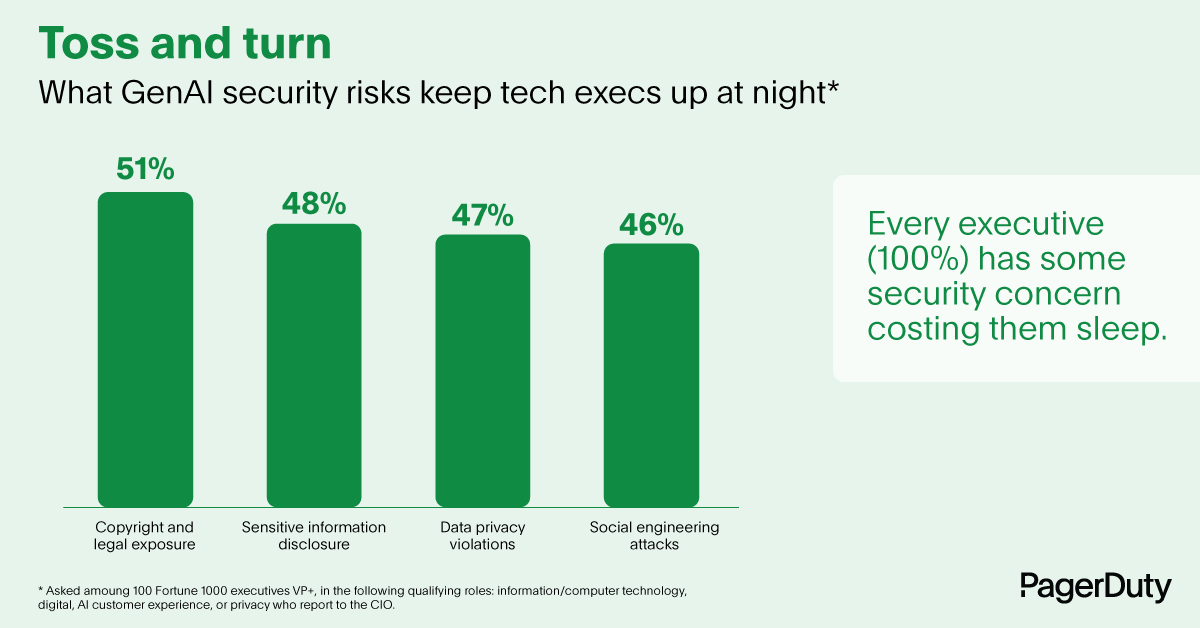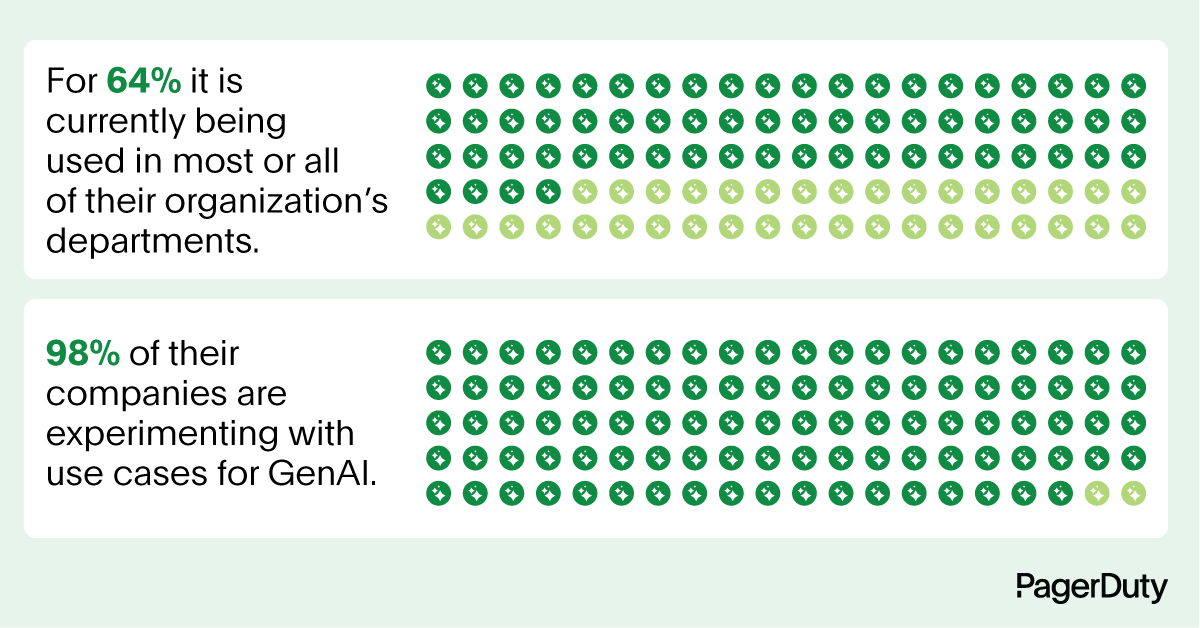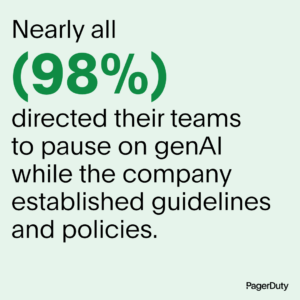Fortune 1,000 Technology Executives Maintain a Distrust of GenAI – Security Risks & Ethics Keep them Up At Night
Survey: 98%* Paused GenAI to Establish Policies, Only 29% Have Guidelines in Place
As organizations rush to capture the promise of GenAI, tech executives at America’s largest companies are wary of security and moral implications. A quarter of these executives do not trust GenAI (25%), according to a survey of 100 Fortune 1,000 executives who report to a CIO by Wakefield Research for PagerDuty.
- 100% of executives surveyed had concerns about the security risks of this technology.
- Unease over copyright and legal exposure keep a majority up at night (51%).
- Others worry overnight about sensitive information disclosure (48%) and data privacy violations (47%)

 PR crisis. Any of these security risks could damage the company’s public image, which explains why GenAI’s risk to the organization’s reputation tops the list of concerns for 50% of respondents. More than 2 in 5 also worry about the ethics of the technology (42%). Among the executives with these moral concerns, inherent societal biases of training data (26%) and lack of regulation (26%) top the list.*
PR crisis. Any of these security risks could damage the company’s public image, which explains why GenAI’s risk to the organization’s reputation tops the list of concerns for 50% of respondents. More than 2 in 5 also worry about the ethics of the technology (42%). Among the executives with these moral concerns, inherent societal biases of training data (26%) and lack of regulation (26%) top the list.*
Reduce speed. Despite working in a business environment that values speed, these tech executives have had to slow the rate of GenAI adoption at their companies. Nearly all (98%) directed their teams to pause on GenAI while the company established guidelines and policies.*
That personal touch. In order to avoid problems, 100% believe human intervention is essential to successfully implement GenAI. Yet the extent of human involvement varies, as 73% believe it requires a moderate amount and 23% believe only a low level is needed. Just 4% think it requires a high level.

Right the first time. Executives value these policies, so much so that a majority (51%) believe they should adopt GenAI only after they have the right guidelines in place. Others believe they risk falling behind if they don’t adopt GenAI as quickly as possible, regardless of parameters (46%).
Rules and regulations. Despite the emphasis and clear need, only 29% of companies have established formal guidelines. Instead, 66% are currently setting up these policies, which means leaders may need to keep pausings on GenAI until they roll out a course of action.
GenAI already in use. For 64% it is currently being used in most or all of their organization’s departments, and 98% of their companies are experimenting with use cases for GenAI.

Slow and steady. A more cautious approach is favored by many. 42% are either still discussing GenAI internally or are experimenting and piloting it, but have not rolled it out. Another 51% are rolling it out and are getting feedback on its use.
 Measured advances. All executives have reasons why their company should avoid rushing to adopt GenAI (100%) and believe implementing it responsibly is paramount. Too many unanswered questions or concerns (49%) and not enough budget to adopt it responsibly (48%) are concerns for nearly half. Additionally, 41% believe a lack of strategy for the responsible use of AI is a reason to avoid rushing in.
Measured advances. All executives have reasons why their company should avoid rushing to adopt GenAI (100%) and believe implementing it responsibly is paramount. Too many unanswered questions or concerns (49%) and not enough budget to adopt it responsibly (48%) are concerns for nearly half. Additionally, 41% believe a lack of strategy for the responsible use of AI is a reason to avoid rushing in.
The bottom line. While GenAI is broadly considered a competitive advantage, tech executives worry about its impact on business. Nearly half are concerned it lacks original thinking (48%), while 42% worry it could cause a bad customer experience and nearly as many (37%) fret over revenue loss.
Blame game. Nearly 2 in 5 executives are worried about inaccuracy in GenAI (38%). The majority believe inaccuracy is likely due to poor data quality or algorithms (69%) instead of human error (31%).
Machine learning. GenAI’s evangelists often praise its promise to free up humans from rote and repetitive tasks, allowing them to focus on more creative pursuits. Companies experimenting with GenAI seem to be following this same path, with supply chain management (46%), customer service automation (45%), and predictive maintenance (43%) being the most popular use cases for GenAI within America’s 1,000 largest companies.*
Spotlight: Coming For Their Jobs
Nearly 2 in 5 Fortune 1,000 executives (38%) believe GenAI will supplant their own job more than their colleagues’ in the next 10 years. Overall, 85% of these executives expect at least some jobs to be impacted within the next 10 years.
CONCLUSION
This study reveals a prevailing sense of caution and apprehension surrounding the adoption of generative AI within America’s largest companies. Executives are acutely aware of the security risks and ethical implications associated with GenAI, with a vast majority opting to pause or slow down its implementation to establish necessary guidelines and policies. While GenAI offers significant potential for streamlining operations and enhancing innovation, addressing these concerns and ensuring human oversight remain crucial for its successful integration into organizational workflows. At PagerDuty, we have been working with AI and machine learning for years and have become the industry leader in AIOps. We are continuously growing our GenAI platform to help address the concerns highlighted throughout this study and ensure confidence in our customers who are excited about using generative AI tools.
METHODOLOGICAL NOTES
The PagerDuty Survey was conducted by Wakefield Research (www.wakefieldresearch.com) among 100 Fortune 1,000 Executives VP+ and are in the following qualifying roles: Information/Computer Technology, Digital, AI, Customer Experience, or Privacy, who report into the CIO, between February 8th and February 19th, 2024, using an email invitation and an online survey. Results of any sample are subject to sampling variation. The magnitude of the variation is measurable and is affected by the number of interviews and the level of the percentages expressing the results. For the interviews conducted in this particular study, the chances are 95 in 100 that a survey result does not vary, plus or minus, by more than 9.8 percentage points from the result that would be obtained if interviews had been conducted with all persons in the universe represented by the sample.
Read the full report here.